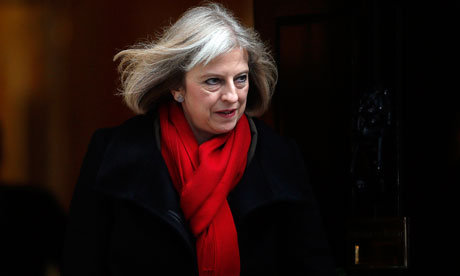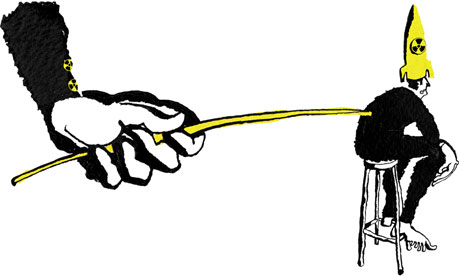Uri Avnery in Outlook India
I MUST start with a shocking confession: I am not afraid of the Iranian nuclear bomb.
I know that this makes me an abnormal person, almost a freak.
But what can I do? I am unable to work up fear, like a real Israeli. Try as I may, the Iranian bomb does not make me hysterical.
MY FATHER once taught me how to withstand blackmail: imagine that the awful threat of the blackmailer has already come about. Then you can tell him: Go to hell.
I have tried many times to follow this advice and found it sound. So now I apply it to the Iranian bomb: I imagine that the worst has already happened: the awful ayatollahs have got the bombs that can eradicate little Israel in a minute.
So what?
According to foreign experts, Israel has several hundred nuclear bombs (assessments vary between 80-400). If Iran sends its bombs and obliterates most of Israel (myself included), Israeli submarines will obliterate Iran. Whatever I might think about Binyamin Netanyahu, I rely on him and our security chiefs to keep our "second strike" capability intact. Just last week we were informed that Germany had delivered another state-of-the-art submarine to our navy for this purpose.
Israeli idiots — and there are some around — respond: "Yes, but the Iranian leaders are not normal people. They are madmen. Religious fanatics. They will risk the total destruction of Iran just to destroy the Zionist state. Like exchanging queens in chess."
Such convictions are the outcome of decades of demonizing. Iranians — or at least their leaders — are seen as subhuman miscreants.
Reality shows us that the leaders of Iran are very sober, very calculating politicians. Cautious merchants in the Iranian bazaar style. They don't take unnecessary risks. The revolutionary fervor of the early Khomeini days is long past, and even Khomeini would not have dreamt of doing anything so close to national suicide.
ACCORDING TO the Bible, the great Persian king Cyrus allowed the captive Jews of Babylon to return to Jerusalem and rebuild their temple. At that time, Persia was already an ancient civilization — both cultural and political.
After the "return from Babylon", the Jewish commonwealth around Jerusalem lived for 200 years under Persian suzerainty. I was taught in school that these were happy years for the Jews.
Since then, Persian culture and history has lived through another two and a half millennia. Persian civilization is one of the oldest in the world. It has created a great religion and influenced many others, including Judaism. Iranians are fiercely proud of that civilization.
To imagine that the present leaders of Iran would even contemplate risking the very existence of Persia out of hatred of Israel is both ridiculous and megalomaniac.
Moreover, throughout history, relations between Jews and Persians have almost always been excellent. When Israel was founded, Iran was considered a natural ally, part of David Ben-Gurion's "strategy of the periphery" — an alliance with all the countries surrounding the Arab world.
The Shah, who was re-installed by the American and British secret services, was a very close ally. Teheran was full of Israeli businessmen and military advisers. It served as a base for the Israeli agents working with the rebellious Kurds in northern Iraq who were fighting against the regime of Saddam Hussein.
After the Islamic revolution, Israel still supported Iran against Iraq in their cruel 8-year war. The notorious Irangate affair, in which my friend Amiram Nir and Oliver North played such an important role, would not have been possible without the old Iranian-Israeli ties.
Even now, Iran and Israel are conducting amiable arbitration proceedings about an old venture: the Eilat-Ashkelon oil pipeline built jointly by the two countries.
If the worst comes to the worst, nuclear Israel and nuclear Iran will live in a Balance of Terror.
Highly unpleasant, indeed. But not an existential menace.
HOWEVER, FOR those who live in terror of the Iranian nuclear capabilities, I have a piece of advice: use the time we still have.
Under the American-Iranian deal, we have at least 10 years before Iran could start the final phase of producing the bomb.
Please use this time for making peace.
The Iranian hatred of the "Zionist Regime" — the State of Israel — derives from the fate of the Palestinian people. The feeling of solidarity for the helpless Palestinians is deeply ingrained in all Islamic peoples. It is part of the popular culture in all of them. It is quite real, even if the political regimes misuse, manipulate or ignore it.
Since there is no ground for a specific Iranian hatred of Israel, it is solely based on the Israeli-Palestinian conflict. No conflict, no enmity.
Logic tells us: if we have several years before we have to live in the shadow of an Iranian nuclear bomb, let's use this time to eliminate the conflict. Once the Palestinians themselves declare that they consider the historic conflict with Israel settled, no Iranian leadership will be able to rouse its people against us.
FOR SEVERAL weeks now, Netanyahu has been priding himself publicly on a huge, indeed historic, achievement.
For the first time ever, Israel is practically part of an Arab alliance.
Throughout the region, the conflict between Muslim Sunnis and Muslim Shiites is raging. The Shiite camp, headed by Iran, includes the Shiites in Iraq, Hezbollah in Lebanon and the Houthis in Yemen. (Netanyahu falsely — or out of ignorance — includes the Sunni Hamas in this camp.)
The opposite Sunni camp includes Saudi Arabia, Egypt and the Gulf states. Netanyahu hints that Israel is now secretly accepted by them as a member.
It is a very untidy picture. Iran is fighting against the Islamic State in Syria and Iraq, which is a mortal enemy of Israel. Iran is supporting the Assad regime in Damascus, which is also supported by Hezbollah, which fights against the lslamic State, while the Saudis support other extreme Sunni Syrians who fight against Assad and the Islamic State. Turkey supports Iran and the Saudis while fighting against Assad. And so on.
I am not enamored with Arab military dictatorships and corrupt monarchies. Frankly, I detest them. But if Israel succeeds in becoming an official member of any Arab coalition, it would be a historic breakthrough, the first in 130 years of Zionist-Arab conflict.
However, all Israeli relations with Arab countries are secret, except those with Egypt and Jordan, and even with these two the contacts are cold and distant, relations between the regimes rather than between the peoples.
Let's face facts: no Arab state will engage in open and close cooperation with Israel before the Israeli-Palestinian conflict is ended. Even kings and dictators cannot afford to do so. The solidarity of their peoples with the oppressed Palestinians is far too profound.
Real peace with the Arab countries is impossible without peace with the Palestinian people, as peace with the Palestinian people is impossible without peace with the Arab countries.
So if there is now a chance to establish official peace with Saudi Arabia and the Gulf States, and to turn the cold peace with Egypt into a real one, Netanyahu should jump at it. The terms of an agreement are already lying on the table: the Saudi peace plan, also called the Arab Initiative, which was adopted many years ago by the entire Arab League. It is based on the two-state solution of the Israeli-Arab conflict.
Netanyahu could amaze the whole world by "doing a de Gaulle" — making peace with the Sunni Arab world (as de Gaulle did with Algeria) which would compel the Shiites to follow suit.
Do I believe in this? I do not. But if God wills it, even a broomstick can shoot.
And on the day of the Jewish Pesach feast, commemorating the (imaginary) exodus from Egypt, we are reminding ourselves that miracles do happen.
Robert Fisk:
When he worked at The Times, Robert Fisk witnessed the curious working practices of the paper's proprietor, Rupert Murdoch. Despite their jocular exchanges, the writer knew he couldn't stay...
Monday, 11 July 2011 in The Independent
He is a caliph, I suppose, almost of the Middle Eastern variety.
You hear all these awful things about Arab dictators and then, when you meet them, they are charm itself. Hafez al-Assad once held my hand in his for a long time with a paternal smile. Surely he can't be that bad, I almost said to myself – this was long before the 1982 Hama massacres. King Hussein would call me "Sir", along with most other journalists. These potentates, in public, would often joke with their ministers. Mistakes could be forgiven.
The "Hitler Diaries" were Murdoch's own mistake, after refusing to countenance his own "expert's" change of heart over the documents hours before The Times and The Sunday Times began printing them. Months later, I was passing by the paper's London office on my way back to Beirut when the foreign editor, Ivan Barnes, held up the Reuters wire copy from Bonn. "Aha!" he thundered. "The diaries are forgeries!" The West German government had proved that they must have been written long after the Führer's death.
So Barnes dispatched me to editor Charles Douglas-Home's office with the Reuters story and I marched in only to find Charlie entertaining Murdoch. "They say they're forgeries, Charlie," I announced, trying not to glance at Murdoch. But I did when he reacted. "Well, there you go," the mogul reflected with a giggle. "Nothing ventured, nothing gained." Much mirth. The man's insouciance was almost catching. Great Story. It only had one problem. It wasn't true.
Oddly, he never appeared the ogre of evil, darkness and poison that he's been made out to be these past few days. Maybe it's because his editors and sub-editors and reporters repeatedly second-guessed what Murdoch would say. Murdoch was owner of The Times when I covered the blood-soaked Israeli invasion and occupation of Lebanon in 1982. Not a line was removed from my reports, however critical they were of Israel. After the invasion, Douglas-Home and Murdoch were invited by the Israelis to take a military helicopter trip into Lebanon. The Israelis tried to rubbish my reporting; Douglas-Home said he stood up for me. On the flight back to London, Douglas-Home and Murdoch sat together. "I knew Rupert was interested in what I was writing," he told me later. "He sort of waited for me to tell him what it was, although he didn't demand it. I didn't show it to him."
But things changed. Before he was editor, Douglas-Home would write for the Arabic-language Al-Majella magazine, often deeply critical of Israel. Now his Times editorials took an optimistic view of the Israeli invasion. He stated that "there is now no worthy Palestinian to whom the world can talk" and – for heaven's sake – that "perhaps at last the Palestinians on the West Bank and in the Gaza Strip will stop hoping that stage-strutters like Mr Arafat can rescue them miraculously from doing business with the Israelis."
All of which, of course, was official Israeli government policy at the time.
Then, in the spring of 1983, another change. I had, with Douglas-Home's full agreement, spent months investigating the death of seven Palestinian and Lebanese prisoners of the Israelis in Sidon. It was obvious, I concluded, that the men had been murdered – the grave-digger even told me that their corpses had been brought to him, hands tied behind their backs, showing marks of bruising. But now Douglas-Home couldn't see how we would be "justified" in running a report "so long after the event".
In other words, the very system of investigative journalism – of fact-checking and months of interviews – became self-defeating. When we got the facts, too much time had passed to print them. I asked the Israelis if they would carry out a military inquiry and, anxious to show how humanitarian they were, they duly told us there would be an official investigation. The Israeli "inquiry" was, I suspected, a fiction. But it was enough to "justify" publishing my long and detailed report. Once the Israelis could look like good guys, Douglas-Home's concerns evaporated.
When he died, of cancer, it was announced that his deputy, Charles Wilson, would edit the paper. Murdoch said that Wilson was "Charlie's choice" and I thought, so, all well and good – until I was chatting to Charlie's widow and she told me that it was the first time she had heard that Wilson's editorship had been her late husband's decision. We all knew Murdoch had signed up to all manner of guarantees of editorial independence, oversight and promises of goodwill when he bought The Times – and had then fired his first editor, Harold Evans. He would deal with the trade unionists later.
Charles Wilson – who much later became, briefly, the editor of The Independent – was a tough, friendly man who could show great kindness, as well as harshness, to his staff. He was kind to me, too. But once, when I was visiting Wilson in London, Murdoch walked into his office. "Hallo, Robert!" Murdoch greeted me, before holding a jocular conversation with Wilson. And, after he had left, Wilson said to me in a hushed voice: "See how he called you by your first name?" This was laughable. It was like the Assad smile or the King Hussein "Sir". It meant nothing. Murdoch was joking with his ministers and courtiers.
A warning sign. Still in west Beirut, where dozens of Westerners were being kidnapped, I opened The Times to discover that a pro-Israeli writer was claiming on our centre page that all journalists in west Beirut, clearly intimidated by "terrorism", could be regarded only as "bloodsuckers". Was the paper claiming that I, too, was a bloodsucker? In all this time, Murdoch had expressed exclusively pro-Israeli views, and had accepted a "Man of the Year" award from a prominent Jewish-American organisation. The Times editorials became more and more pro-Israeli, their use of the word "terrorist" ever more promiscuous.
The end came for me when I flew to Dubai in 1988 after the USS Vincennes had shot down an Iranian passenger airliner over the Gulf. Within 24 hours, I had spoken to the British air traffic controllers at Dubai, discovered that US ships had routinely been threatening British Airways airliners, and that the crew of the Vincennes appeared to have panicked. The foreign desk told me the report was up for the page-one splash. I warned them that American "leaks" that the IranAir pilot was trying to suicide-crash his aircraft on to the Vincennes were rubbish. They agreed.
Next day, my report appeared with all criticism of the Americans deleted, with all my sources ignored. The Times even carried an editorial suggesting the pilot was indeed a suicider. A subsequent US official report and accounts by US naval officers subsequently proved my dispatch correct. Except that Times readers were not allowed to see it. This was when I first made contact with The Independent. I didn't believe in The Times any more – certainly not in Rupert Murdoch.
Months later, a senior night editor who had been on duty on the night my Vincennes report arrived, recalled in a letter that he had promoted my dispatch as the splash, but that Wilson had said: "There's nothing in it. There's not a fact in it. I wouldn't even run this gibberish." Wilson, the night editor said, called it "bollocks" and "waffle". The night editor's diary for that day finished: "Shambles, chaos on Gulf story. [George] Brock [Wilson's foreign editor] rewrites Fisk."
The good news: a few months later, I was Middle East correspondent for The Independent. The bad news: I don't believe Murdoch personally interfered in any of the above events. He didn't need to. He had turned The Times into a tame, pro-Tory, pro-Israeli paper shorn of all editorial independence. If I hadn't been living in the Middle East, of course, it might have taken me longer to grasp all this.
But I worked in a region where almost every Arab journalist knows the importance of self-censorship – or direct censorship – and where kings and dictators do not need to give orders. They have satraps and ministers and senior police officers – and "democratic" governments – who know their wishes, their likes and dislikes. And they do what they believe their master wants. Of course, they all told me this was not true and went on to assert that their king/president was always right.
These past two weeks, I have been thinking of what it was like to work for Murdoch, what was wrong about it, about the use of power by proxy. For Murdoch could never be blamed. Murdoch was more caliph than ever, no more responsible for an editorial or a "news" story than a president of Syria is for a massacre – the latter would be carried out on the orders of governors who could always be tried or sacked or sent off as adviser to a prime minister – and the leader would invariably anoint his son as his successor. Think of Hafez and Bashar Assad or Hosni and Gamal Mubarak or Rupert and James. In the Middle East, Arab journalists knew what their masters wanted, and helped to create a journalistic desert without the water of freedom, an utterly skewed version of reality. So, too, within the Murdoch empire.
In the sterile world of the Murdochs, new technology was used to deprive the people of their freedom of speech and privacy. In the Arab world, surviving potentates had no problem in appointing tame prime ministers. Nothing ventured, nothing gained.
You hear all these awful things about Arab dictators and then, when you meet them, they are charm itself. Hafez al-Assad once held my hand in his for a long time with a paternal smile. Surely he can't be that bad, I almost said to myself – this was long before the 1982 Hama massacres. King Hussein would call me "Sir", along with most other journalists. These potentates, in public, would often joke with their ministers. Mistakes could be forgiven.
The "Hitler Diaries" were Murdoch's own mistake, after refusing to countenance his own "expert's" change of heart over the documents hours before The Times and The Sunday Times began printing them. Months later, I was passing by the paper's London office on my way back to Beirut when the foreign editor, Ivan Barnes, held up the Reuters wire copy from Bonn. "Aha!" he thundered. "The diaries are forgeries!" The West German government had proved that they must have been written long after the Führer's death.
So Barnes dispatched me to editor Charles Douglas-Home's office with the Reuters story and I marched in only to find Charlie entertaining Murdoch. "They say they're forgeries, Charlie," I announced, trying not to glance at Murdoch. But I did when he reacted. "Well, there you go," the mogul reflected with a giggle. "Nothing ventured, nothing gained." Much mirth. The man's insouciance was almost catching. Great Story. It only had one problem. It wasn't true.
Oddly, he never appeared the ogre of evil, darkness and poison that he's been made out to be these past few days. Maybe it's because his editors and sub-editors and reporters repeatedly second-guessed what Murdoch would say. Murdoch was owner of The Times when I covered the blood-soaked Israeli invasion and occupation of Lebanon in 1982. Not a line was removed from my reports, however critical they were of Israel. After the invasion, Douglas-Home and Murdoch were invited by the Israelis to take a military helicopter trip into Lebanon. The Israelis tried to rubbish my reporting; Douglas-Home said he stood up for me. On the flight back to London, Douglas-Home and Murdoch sat together. "I knew Rupert was interested in what I was writing," he told me later. "He sort of waited for me to tell him what it was, although he didn't demand it. I didn't show it to him."
But things changed. Before he was editor, Douglas-Home would write for the Arabic-language Al-Majella magazine, often deeply critical of Israel. Now his Times editorials took an optimistic view of the Israeli invasion. He stated that "there is now no worthy Palestinian to whom the world can talk" and – for heaven's sake – that "perhaps at last the Palestinians on the West Bank and in the Gaza Strip will stop hoping that stage-strutters like Mr Arafat can rescue them miraculously from doing business with the Israelis."
All of which, of course, was official Israeli government policy at the time.
Then, in the spring of 1983, another change. I had, with Douglas-Home's full agreement, spent months investigating the death of seven Palestinian and Lebanese prisoners of the Israelis in Sidon. It was obvious, I concluded, that the men had been murdered – the grave-digger even told me that their corpses had been brought to him, hands tied behind their backs, showing marks of bruising. But now Douglas-Home couldn't see how we would be "justified" in running a report "so long after the event".
In other words, the very system of investigative journalism – of fact-checking and months of interviews – became self-defeating. When we got the facts, too much time had passed to print them. I asked the Israelis if they would carry out a military inquiry and, anxious to show how humanitarian they were, they duly told us there would be an official investigation. The Israeli "inquiry" was, I suspected, a fiction. But it was enough to "justify" publishing my long and detailed report. Once the Israelis could look like good guys, Douglas-Home's concerns evaporated.
When he died, of cancer, it was announced that his deputy, Charles Wilson, would edit the paper. Murdoch said that Wilson was "Charlie's choice" and I thought, so, all well and good – until I was chatting to Charlie's widow and she told me that it was the first time she had heard that Wilson's editorship had been her late husband's decision. We all knew Murdoch had signed up to all manner of guarantees of editorial independence, oversight and promises of goodwill when he bought The Times – and had then fired his first editor, Harold Evans. He would deal with the trade unionists later.
Charles Wilson – who much later became, briefly, the editor of The Independent – was a tough, friendly man who could show great kindness, as well as harshness, to his staff. He was kind to me, too. But once, when I was visiting Wilson in London, Murdoch walked into his office. "Hallo, Robert!" Murdoch greeted me, before holding a jocular conversation with Wilson. And, after he had left, Wilson said to me in a hushed voice: "See how he called you by your first name?" This was laughable. It was like the Assad smile or the King Hussein "Sir". It meant nothing. Murdoch was joking with his ministers and courtiers.
A warning sign. Still in west Beirut, where dozens of Westerners were being kidnapped, I opened The Times to discover that a pro-Israeli writer was claiming on our centre page that all journalists in west Beirut, clearly intimidated by "terrorism", could be regarded only as "bloodsuckers". Was the paper claiming that I, too, was a bloodsucker? In all this time, Murdoch had expressed exclusively pro-Israeli views, and had accepted a "Man of the Year" award from a prominent Jewish-American organisation. The Times editorials became more and more pro-Israeli, their use of the word "terrorist" ever more promiscuous.
The end came for me when I flew to Dubai in 1988 after the USS Vincennes had shot down an Iranian passenger airliner over the Gulf. Within 24 hours, I had spoken to the British air traffic controllers at Dubai, discovered that US ships had routinely been threatening British Airways airliners, and that the crew of the Vincennes appeared to have panicked. The foreign desk told me the report was up for the page-one splash. I warned them that American "leaks" that the IranAir pilot was trying to suicide-crash his aircraft on to the Vincennes were rubbish. They agreed.
Next day, my report appeared with all criticism of the Americans deleted, with all my sources ignored. The Times even carried an editorial suggesting the pilot was indeed a suicider. A subsequent US official report and accounts by US naval officers subsequently proved my dispatch correct. Except that Times readers were not allowed to see it. This was when I first made contact with The Independent. I didn't believe in The Times any more – certainly not in Rupert Murdoch.
Months later, a senior night editor who had been on duty on the night my Vincennes report arrived, recalled in a letter that he had promoted my dispatch as the splash, but that Wilson had said: "There's nothing in it. There's not a fact in it. I wouldn't even run this gibberish." Wilson, the night editor said, called it "bollocks" and "waffle". The night editor's diary for that day finished: "Shambles, chaos on Gulf story. [George] Brock [Wilson's foreign editor] rewrites Fisk."
The good news: a few months later, I was Middle East correspondent for The Independent. The bad news: I don't believe Murdoch personally interfered in any of the above events. He didn't need to. He had turned The Times into a tame, pro-Tory, pro-Israeli paper shorn of all editorial independence. If I hadn't been living in the Middle East, of course, it might have taken me longer to grasp all this.
But I worked in a region where almost every Arab journalist knows the importance of self-censorship – or direct censorship – and where kings and dictators do not need to give orders. They have satraps and ministers and senior police officers – and "democratic" governments – who know their wishes, their likes and dislikes. And they do what they believe their master wants. Of course, they all told me this was not true and went on to assert that their king/president was always right.
These past two weeks, I have been thinking of what it was like to work for Murdoch, what was wrong about it, about the use of power by proxy. For Murdoch could never be blamed. Murdoch was more caliph than ever, no more responsible for an editorial or a "news" story than a president of Syria is for a massacre – the latter would be carried out on the orders of governors who could always be tried or sacked or sent off as adviser to a prime minister – and the leader would invariably anoint his son as his successor. Think of Hafez and Bashar Assad or Hosni and Gamal Mubarak or Rupert and James. In the Middle East, Arab journalists knew what their masters wanted, and helped to create a journalistic desert without the water of freedom, an utterly skewed version of reality. So, too, within the Murdoch empire.
In the sterile world of the Murdochs, new technology was used to deprive the people of their freedom of speech and privacy. In the Arab world, surviving potentates had no problem in appointing tame prime ministers. Nothing ventured, nothing gained.






 Convinced
that the overwhelming weight of evidence favors a
negative verdict if the ICJ ever braved such an
initiative, ElBaradei then makes a case for the
International Criminal Tribunal to "investigate
whether this constitutes a war crime". (pg 87)
Convinced
that the overwhelming weight of evidence favors a
negative verdict if the ICJ ever braved such an
initiative, ElBaradei then makes a case for the
International Criminal Tribunal to "investigate
whether this constitutes a war crime". (pg 87)